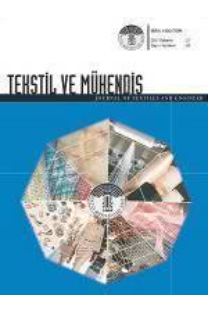Termoplastik Nişasta Esaslı Biyokompozitlerin Üretimi için Yeni Bir Yaklaşım
Jüt lifleri, termoplastik nişasta, biyokompozitler, morfolojik karakterizasyon, mekanik karakterizasyon
A Novel Approach for Fabrication of Thermoplastic Starch Based Biocomposites
Jute fibers, thermoplastic starch, biocomposites, morphological characterization, mechanical characterization,
___
- -
- ISSN: 1300-7599
- Yayın Aralığı: Yılda 4 Sayı
- Başlangıç: 1987
- Yayıncı: TMMOB Tekstil Mühendisleri Odası
AHP VE TOPSIS YÖNTEMLERİ İLE TEDARİKÇİ SEÇİMİ: HAZIR GİYİM SEKTÖRÜNDE BİR UYGULAMA
Sargı Lifi ve Öz Materyalinin Çift Özlü İpliklerin Kalite Özelliklerine Etkileri
FARKLI TİP ÇAPRAZ BAĞLAYICILARIN VİSKON KUMAŞ ÖZELLİKLERİ ÜZERİNE ETKİLERİNİN İNCELENMESİ
Mehmet ORHAN, Mehmet TIRITOĞLU, Gizem ZİNETBAŞ
İlkan ÖZKAN, İlhami İLHAN, Ahmet Yiğit YARAR
MİKROKAPSÜL UYGULANMIŞ KUMAŞLARIN TRANSFER VE FONKSİYONEL ÖZELLİKLERİNİN İNCELENMESİ
Ömer Faruk CENGİZ, İslam ERKALE, Sennur ALAY AKSOY, Bekir BOYACI, Sibel KAPLAN
Denim Pantolonlarda Kullanılan Zincir ve Düz Dikişin Dikim Performansının İncelenmesi
Mert ATEŞ, Ayça GÜRARDA, E.kenan ÇEVEN
Termoplastik Nişasta Esaslı Biyokompozitlerin Üretimi için Yeni Bir Yaklaşım
Hatice Aylin KARAHAN TOPRAKÇI, Ayşe TURGUT, Ozan TOPRAKÇI
LİF KARIŞIM ORANI VE TOZ ALMA İŞLEMİNİN WİLTON TİPİ YÜZ-YÜZE HALILARIN TOZUMA DERECESİNE ETKİLERİ
Esin SARIOĞLU, Osman BABAARSLAN, Sıdıka Ziba OR
AHP ve TOPSIS Yöntemleri ile Tedarikçi Seçimi: Hazır Giyim Sektöründe Bir Uygulama
